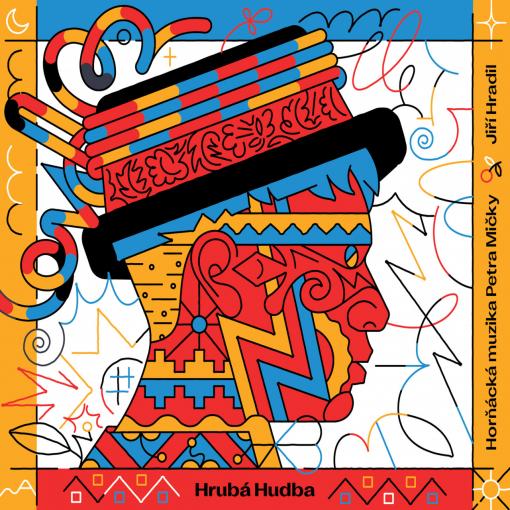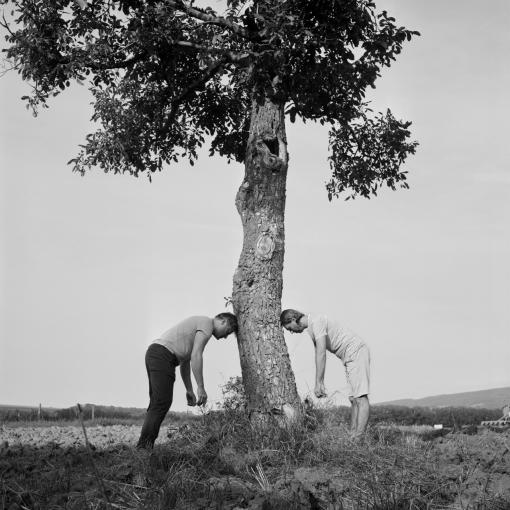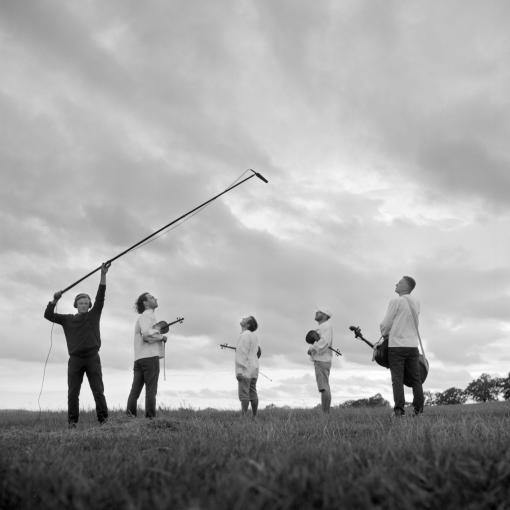Several years ago, a miracle happened to Jura Hradil. This devotee of the electronic nu jazz alternative came to the hilly Carpathian landscape somewhere on the border between Moravia and Slovakia and heard a song, firstly one, then two, then hundreds. It wasn't a blurry echo of old times, but the bright tone of a Horňácko song.
Janáček, Novák, Merta or Havelka had already discovered a similar miracle of folk songs in the same place many years before Hradil. There is nothing enviable on experiencing a miracle, everyone is dealing with it differently. The result of Jura's putting up with this profound experience was his album Hrubá hudba [Rough Music]. Among all the bandleaders, musicians and singers both male and female, this manner was brave and worthy of admiration. He was not alone for this task. He invited Petr Mička's Horňácká muzika [Horňácko Band] to lend a hand, which was a great and probably also the only possible choice. I do not know anyone who can interpret the music of the Horňácko region with such an impressive effect, knowing its roots in depth and at the same time having a mind open to new, in the purest sense of the word alternative approaches.
Jiří Hradil approached his idea responsibly. He would travel to Horňácko, collect material, get to know the environment, go through the entire "fašank" [carnival] path. This research approach is unusual in today's superfast times and it is one of the greatest benefits of this album.

There are a huge number of folklore fusions and a lot more are still being created. However, such a responsible approach is rarely encountered.
Let me be precise: this is a double album. The first CD bears the aforementioned title Hrubá hudba and it is an authorial achievement of Jura Hradil with the help of musicians from the band of Petr Mička and several Horňácko singers. Three guests from non-folklore ranks were also invited: rapper Kato, Jaroslav Rudiš and Slovak female vocalist Katarzia. These artists logically harmonize with the mood of the album. In the end, however, I was a little disappointed against my expectations, because the inwardness put in the project by Jura Hradil is not transferable to someone who does not have a similar feeling of Horňácko songs. However, I recognize that it may be a subjective opinion of a person suffering from this Horňácko enchantment. However, Hrubá hudba is full of different musicians' ideas and everything works together in the overall impression the album leaves. Ambient approach in this case is brilliantly exploited and substitutes authenticity, that is - in my opinion - absolutely necessary for the proper enjoyment of folk songs.
For the conservative environment of folklore enthusiasts, these are perhaps ideas from another universe. I would, however, suggest these people to visit one of the concerts of Hrubá hudba. It might and should convince them with its atmosphere that although the folklore material is approached in a very unusual manner here, it is not any rape, but rather a deep respect and best conscience, with which the author put his craft into it.
The second album carries a title Hlasy starého světa [Voices of the Old World]. It was made under the direction of the bandleader Petr Mička, a Horňácko musician, who truthfully and loyally follows on the singing and violin play of old folk musicians. The album tries to explore this continuous music line. On the album, we can hear singers of the oldest generation such as Dušan Holý, Martin Čambala or Anna Šajdlerová. However, to make the continuity even more obvious, Mička also invited younger singers, such as Karel Fajmov, and Janíček Pavlík of the youngest ones. In the final set of songs you can hear the bandleader himself – his voice is among those most distinctive in the present generation.

The uniqueness of the recordings is enhanced by the recording method. In some cases, the studio was replaced by a meadow, a barn or an old cottage. The sounds of the surroundings, imperfections of the voices of older singers and their post-comments are also left in place. In the case of singer Eva Grombířová, the outdoor microphone echoes the tweeting of a chaffinch, or we can hear Martin Čambala, who remembers what he sang to his wife when he went to serve in the army. This combination is truly interesting. Thus, at certain moments of the album, artistic quality is perfectly blended with the documentary line. In this case, we can again see the harmony between Petr Mička and Jura Hradil. Petr put not only his art but also ethnological knowledge into the songs, and Jura Hradil sensitively made most field recordings, using his own equipment. Both of the guys created a musical picture of the region. Many musicians prior to them set a similar goal and certainly a lot of them have succeeded. Hence, we can be happy to have another piece of art that goes beyond borders – not only of the region and of the Czech Republic, but also the borders of perception of folk music in general.
Last but not least, I should not forget to mention the visual quality of the whole CD. The introductory page with graphics created by Marek Ehrenberger is unconventional, tasteful and simply beautiful, which is a little miracle in the folklore environment. The booklet is clear and listeners will find in it all the information they might be interested in. At the same time, it does not force you into a single “correct” performance and interpretation of the artistic intention of the authors, but leaves room for imagination instead. The cover is accompanied by slightly controversial, but all the more so interesting photographs by Roman Franc, which depict a slightly altered reality of the Horňácko region. All this put together makes this album a unique piece of art not only today, but maybe even in another five or twenty years. The adjective "hrubý" [rough, gross] also means "great" in the Horňácko region – and this album definitely deserves a name like that.
































No comment added yet..